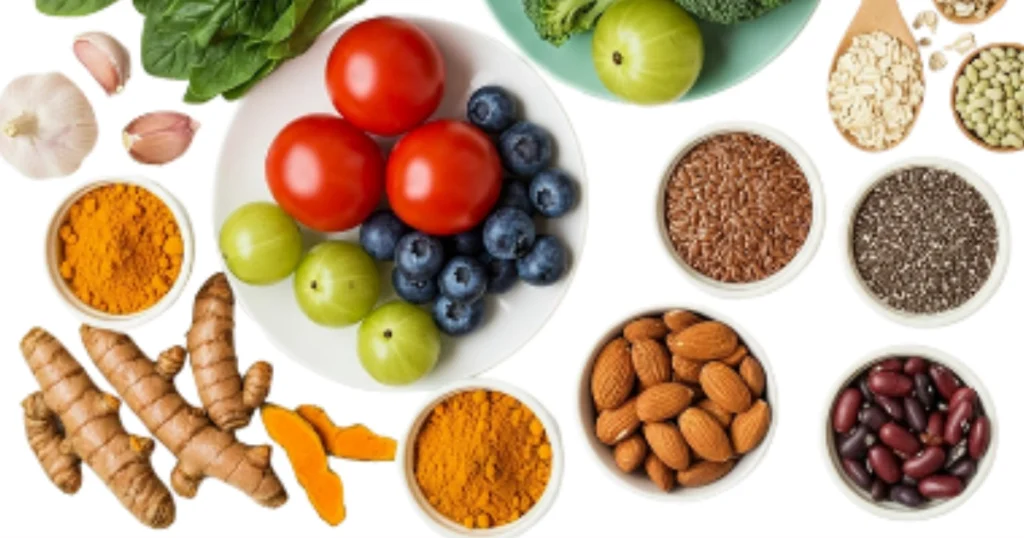Every bite you take affects your health—even your long-term cancer risk. A growing body of evidence shows that a diet rich in plants, fiber, and whole foods can reduce the likelihood of developing cancer. This article gently explores how everyday meals can become part of your cancer-prevention strategy—with practical tips, delicious food ideas, and seasonal guidance that honors both science and flavor.

The Role of Diet in Cancer Prevention
Discussing how nutrition influences cancer begins with understanding phytochemicals—naturally occurring plant compounds such as polyphenols, anthocyanins, sulforaphane, and curcumin. These act as protective agents in the body, helping neutralize harmful free radicals and slowing abnormal cell growth.
Health organizations like the American Institute for Cancer Research emphasize diets high in fruits, vegetables, whole grains, legumes, nuts, and seeds as key to reducing cancer risk. Whole grains and fiber-rich foods are linked to lower colorectal and breast cancer risk. Daily fiber intake (about 25 g) is commonly recommended for protection.
Green tea and coffee contain antioxidants that may modestly reduce risk of certain cancers, although the evidence remains mixed for green tea. Emerging research also highlights the role of healthy fats—especially omega-3 fatty acids found in walnuts, flax, chia, and fatty fish—in reducing inflammation and inhibiting tumor growth.
Studies also show that diets high in red and processed meats, excessive sugar, and refined carbs increase cancer risk. Many cancer advisory bodies recommend limiting these foods.
Step-by-Step Guide: Foods to Include
Here’s a practical daily and weekly food plan to help lower your cancer risk—packed with flavor and nutrition.
- Berries (blueberries, strawberries, raspberries): Rich in anthocyanins and polyphenols. Include a handful or a smoothie bowl snack most days.
- Cruciferous vegetables (broccoli, cauliflower, cabbage, Brussels sprouts): Contain sulforaphane and glucosinolates. Aim for several servings weekly.
- Fibrous whole grains (oats, brown rice, quinoa, whole-wheat): Provide fiber that supports gut health. Enjoy oatmeal or grain salads daily.
- Legumes (lentils, beans, chickpeas): High in fiber, protein, and phytochemicals. Try plant-based meals a few times a week.
- Nuts & seeds (walnuts, almonds, chia, flax): Provide omega-3s, vitamin E, selenium. A daily handful is protective.
- Green tea & coffee: Choose unsweetened versions. Linked to reduced risk of certain cancers.
- Spices & herbs (turmeric, garlic, ginger, oregano): Curcumin and allicin have potent anti-inflammatory benefits.
- Olive oil (extra-virgin): A staple in the Mediterranean diet with antioxidant polyphenols.
- Tomatoes & red fruits: Lycopene supports prostate and digestive tract health. Cooked tomatoes are more bioavailable.
- Yogurt (plain, unsweetened): Supports gut health via probiotics.
Common Mistakes and How to Avoid Them
- Relying on single “superfoods”: No single food prevents cancer. Focus on balance and variety.
- Neglecting fiber: Ensure you’re getting at least 25g per day through whole foods.
- Overconsumption of processed meats: Limit bacon, sausage, ham, and deli meats.
- Sugary drinks: These contribute to inflammation and obesity. Opt for water, herbal teas, or unsweetened drinks.
- Ignoring cooking methods: Grilling meat at high temps can create harmful compounds. Use marinades and lower heat.
- Limited food diversity: Rotate different colored vegetables and grains weekly to diversify your nutrient intake.
Benefits of Eating Cancer-Risk-Reducing Foods
- Reduces oxidative stress: Neutralizes free radicals that damage cells.
- Supports healthy weight: High-fiber foods keep you full longer.
- Improves gut health: Fiber and probiotics nourish beneficial bacteria.
- Lowers inflammation: Omega-3s, turmeric, garlic, and green tea help reduce chronic inflammation.
- Boosts immune function: Nutrients in nuts, berries, and herbs enhance immune response.
- Promotes sustainable wellness: Also supports cardiovascular, metabolic, and digestive health.
Seasonal and Regional Tips
Spring
- Eat citrus fruits, asparagus, early greens, strawberries, and radishes.
Summer
- Enjoy tomatoes, melons, cucumbers, berries, corn, and grilled zucchini.
Autumn
- Roast squash, carrots, apples, and sweet potatoes. Add pumpkin seeds and cinnamon.
Winter
- Rely on frozen berries, root vegetables, legumes, and citrus.
Mediterranean/North African focus
- Use olives, lentils, chickpeas, figs, dates, pomegranates, turmeric, cumin, and olive oil.
🥗 Tools & Materials Checklist
- ✅ Fresh fruits and vegetables (berries, greens, tomatoes)
- ✅ Whole grains (brown rice, oats, quinoa)
- ✅ Legumes (beans, chickpeas, lentils)
- ✅ Seeds and nuts (walnuts, chia, flax)
- ✅ Olive oil, herbs, and spices
- ✅ Plain yogurt or kefir
- ✅ Tea (green, herbal) and coffee (black)
- ✅ Cooking pans and storage containers
❓ FAQs
What foods help reduce cancer risk?
Whole plant foods: fruits, vegetables, grains, legumes, nuts, seeds, herbs, and spices.
Can turmeric or garlic help prevent cancer?
Yes, curcumin (in turmeric) and allicin (in garlic) are linked to anti-cancer activity.
How much fiber is needed daily?
About 25 grams from food like vegetables, grains, legumes, and fruits.
Is red meat a cancer risk?
Frequent consumption, especially processed red meats, is linked to colorectal cancer.
Are nuts and seeds protective?
Yes, they provide omega-3s, antioxidants, and minerals that support cell health.
Encouraging Conclusion
Your kitchen is one of your best defenses against chronic illness. By making intentional, flavorful food choices, you not only protect your long-term health but also inspire others to do the same. What colorful foods fill your plate? Let us know in the comments—and don’t forget to share this guide with friends who value wellness and natural prevention. 🌟


https://t.me/site_official_1win/193
https://t.me/s/dragon_money_mani/25
**mitolyn reviews**
Mitolyn is a carefully developed, plant-based formula created to help support metabolic efficiency and encourage healthy, lasting weight management.